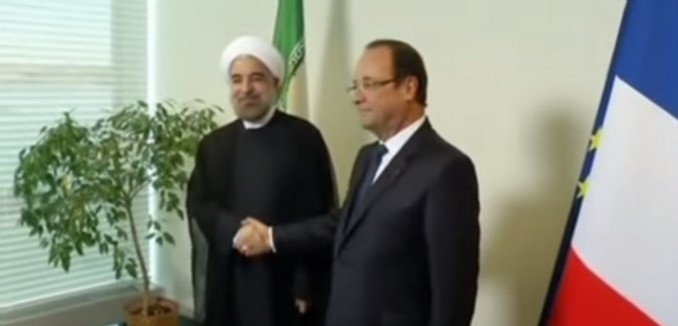The Iranians continue to show signs of inflexibility in the negotiations over Tehran’s nuclear program taking place in Lausanne, Switzerland. French Foreign Minister Laurent Fabius, in comments to reporters at United Nations headquarters in New York, said that Iranian President Hassan Rouhani was “not very precise” about Tehran’s willingness to compromise in his telephone conversation with French President Francois Hollande Thursday. Fabius is scheduled to arrive in Lausanne on Saturday morning. France has taken the toughest line of any of the P5+1 countries during the negotiations, reportedly causing tensions between Paris and Washington. At one point during the negotiations, Fabius called the French negotiating team to urge them not to make any more concessions.
Iranian intransigence has been a thematic element of the nuclear talks. On Wednesday, Iranian Foreign Minister Mohammad Javad Zarif said that immediate lifting of sanctions was a prerequisite for a nuclear deal and made clear that “This is the position that the government has insisted on from the start.” In May 2014, Reuters reported that Iranian Supreme Leader Ayatollah Ali Khamenei called demands for halts on ballistic missile production “stupid and idiotic.” When the U.S. delegation said that it wanted to discuss ballistic missile development and past possible military dimensions of Iran’s nuclear program, Zarif “merely laughed and ignored the remarks,” according to an Iranian present at the scene. That same month, the spokesman for the Atomic Energy Organization of Iran (AEOI) stated, “The Arak heavy water reactor is unalterable and will remain a heavy water reactor.” Also that month, at an AEOI ceremony in Tehran, Rouhani announced that Iran “will not retreat a single step in the field of nuclear energy and we will not accept nuclear apartheid.”
In April 2014, AEOI chief Ali Akbar Salehi was quoted as saying, “In order to meet the Bushehr power plant’s annual need for fuel, we should have 50,000 centrifuges.” He went on to say that Iran was entitled to enrich uranium up to 90%, which is weapons-grade level. Khamenei, also in April 2014, refused the notion of ceasing nuclear research and development: “Consent was given to the nuclear talks in order to break up the hostile atmosphere created by the hegemonistic [sic] front against Iran, but all people should be aware that despite the fact that the talks will continue, the Islamic Republic of Iran will not halt its activities with regard to nuclear research and development.”
Iran has consistently stonewalled the International Atomic Energy Agency’s (IAEA) attempts to investigate possible military dimensions (PMD) of its program. The IAEA and Iran entered an agreement in 2013, in which the IAEA put forth 12 questions Iran needed to answer about PMD, of which Iran has only addressed one. Iran has repeatedly refused the IAEA access to the Parchin military site, where it is believed there has been high-explosives testing in relation to a nuclear weapon. Earlier this month, IAEA Director General Yukiya Amano repeated his organization’s assessment that it “is not in a position to provide credible assurance about the absence of undeclared nuclear material and activities in Iran, and therefore to conclude that all nuclear material in Iran is in peaceful activities.”
The lack of Iranian cooperation in the area of PMD prompted an editorial (Google link) today in The Wall Street Journal to observe that, “Without Iranian disclosure of past illicit activities, including nuclear enrichment and weaponization research, it’s hard to see how the Obama Administration can honor its core pledge to strike a deal that would give the West a one-year warning if Iran decides to build a bomb.”
[Photo: Reuters / YouTube ]




